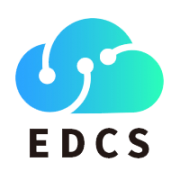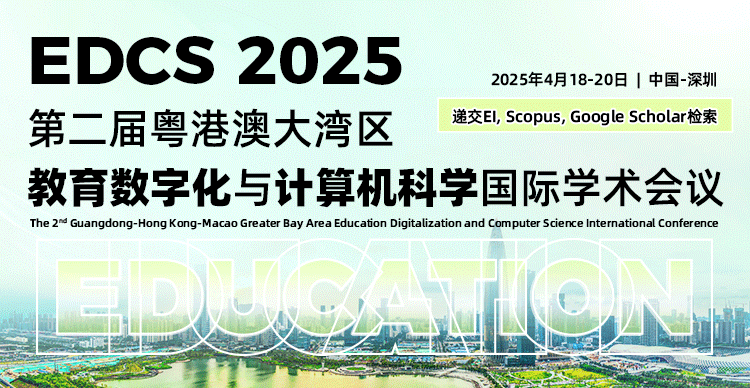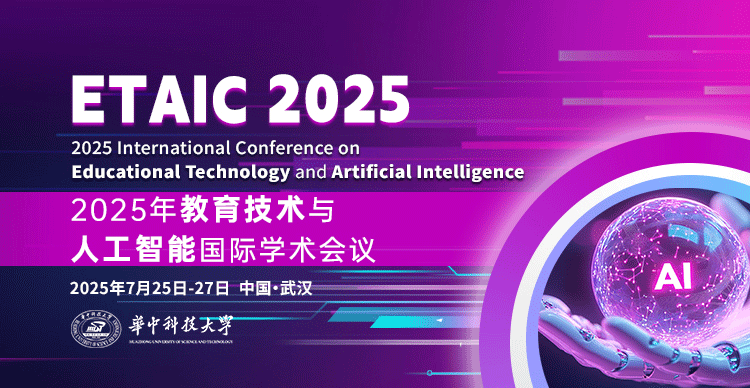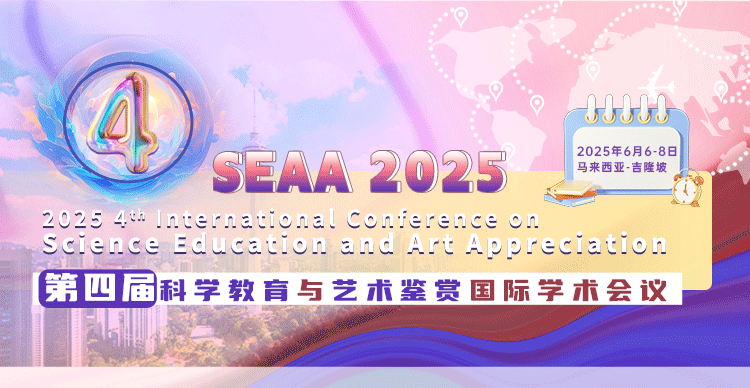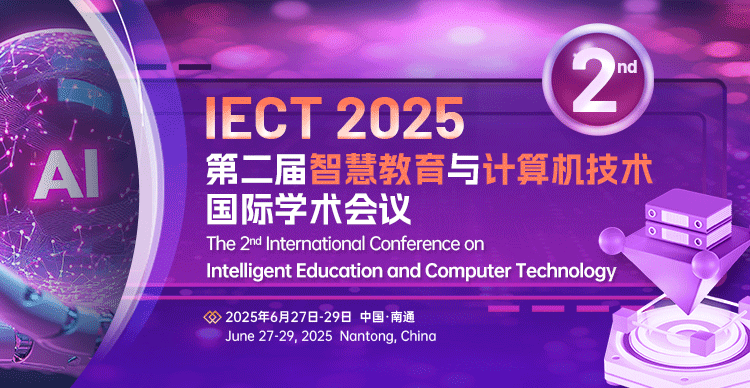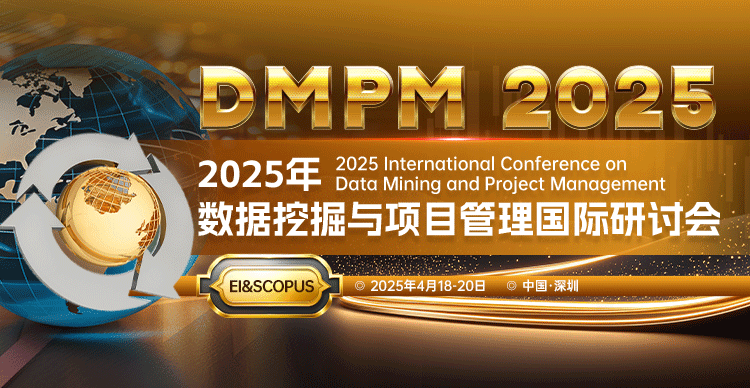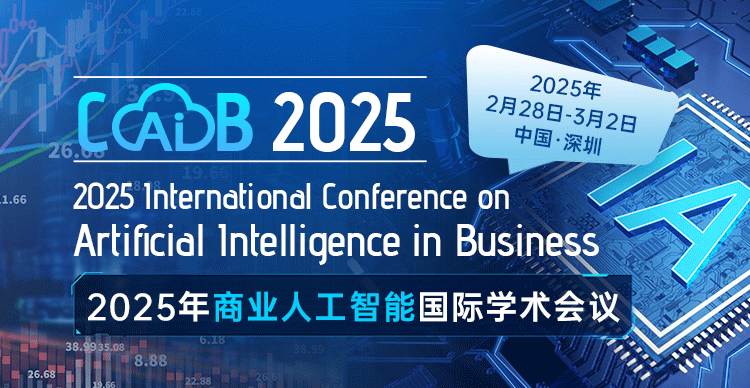第二届粤港澳大湾区教育数字化与计算机科学国际学术会议
The 2nd Guangdong-Hong Kong-Macao Greater Bay Area Education Digitalization and Computer Science International Conference
大会简介
第二届粤港澳大湾区教育数字化与计算机科学国际学术会议(EDCS 2025)将于2025年4月18日至20日在深圳召开。
本次会议旨在聚焦教育数字化和计算机科学领域的前沿研究与实践,面对快速发展的数字技术和教育模式的变革,推动教育系统的创新发展。会议将为研究人员、教育工作者和行业从业者提供一个交流思想、展示创新实践及探讨教育数字化影响的平台。
与首届会议相比,本届会议的主题将更加广泛,涵盖人工智能在教育中的应用、数据隐私问题、虚拟现实对学习体验的影响等多个方面。这些新增加的议题体现了教育实践在数字化驱动下的持续转型,强调了跨学科合作的必要性。EDCS 2025 旨在促进各方之间的对话,探索数字教育的新范式。
EDCS 2025 的主要目标是创建一个鼓励创新思维和合作的论坛,推动教育数字化领域的研究与应用。会议希望通过为参与者提供分享研究成果和最佳实践的机会,架起理论与实践之间的桥梁。与来自不同学术背景、行业和政策制定者的与会者建立联系,共享最新的发展趋势和技术见解,共同促进粤港澳大湾区及全球教育的变革与发展。
支持单位
香港大学
香港浸会大学
澳门大学
北京语言大学
大会组委(邀请中,延续部分往届专家)
大会主席
唐遠炎教授-澳门大学(IEEE Life Fellow, IAPR Fellow, AAIA Fellow)
程序委员会主席
梁耀榮教授-香港浸会大学( IEEE Senior member)
于中根教授-北京语言大学
黃君義副教授-香港大学( IEEE Senior member)
主讲嘉宾
Ching Y. Suen教授(IEEE Life Fellow)-康考迪亚大学(康大),加拿大
谢明副教授(IEEE Senoir Member)-南洋理工大学,新加坡
Ts. Dr. Teoh Ai Ping副教授-马来西亚理科大学
征稿主题
■ 教育数字化
- 教育技术,教育统计,科学教育
- 体育教育,学科教育,医学教育
- 智能教育,协作学习,远程学习
- 工程教育,教学方法,混合式学习
- 电子学习环境,教育信息工程
- 基于网络的学习
- 高等教育与职业培训
- 电子学习平台、门户
- 社会背景和学习环境
- 创作工具和内容开发
- 残疾用户的可访问性
- 沉浸式学习和多媒体应用
- 课程设计与电子学习课程
- 课程和机构的评估和认可
- 终身学习:持续专业培训和发展
- 全球背景下的远程和电子学习
- 工程教育与伦理
- 计算机辅助评估
- 标准和互操作性
- 指标和绩效衡量
- AV-通信和多媒体
- 本体和元数据标准
- 电子学习硬件和软件
- 泛在学习评估软件工具
- 教育技术与电子学习
- 领域应用和案例研究
- 人机交互和用户体验
- 数据科学和大数据分析
- 计算机视觉和图像处理
- 计算机图形学与可视化
- 电子测试和新的测试理论
- 虚拟实验室和虚拟教室
- 智能学与教系统
- 其他相关主题方向
■ 计算机科学
- 计算机系统
- 计算机图形学
- 计算机辅助技术
- 计算机软件与理论
- 计算机建模与仿真
- 计算机网络与信息安全
- 计算机图形图像处理与识别
- 人工智能
- 机器学习、深度学习
- 智慧交通与智慧城市
- 云计算
- 网络安全
- 区块链技术
- 娱乐和游戏
- 社交媒体分析
- 人机交互和用户体验
- 增强现实和显示应用
- 智能计算与智能软件
- 虚拟现实与混合现实
- 数据科学与大数据技术
- 智能手机和移动设备技术
- 医学信息软件
- 数据库与数据挖掘
- 数字媒体技术与系统
- 智能控制与脑信息学
- 软件工程与信息系统
- 音频/视频系统和信号处理
- 计算机仿真及虚拟现实技术
- 中间件技术与异构系统集成
- 其他相关主题方向
其他与教育数字化,计算机科学相关主题,均可投稿!
论文出版
1、会议投稿
本会议投稿经过2-3位组委会专家严格审核之后,最终所录用的论文将被会议论文集出版,出版后将被提交EI Compendex,Scopus检索。目前该出版社EI Compendex,Scopus检索非常稳定。
注意事项:
1. 论文需按照会议论文模板排版,不得少于8页。
2. 会议论文模板下载→ 前往“会议资料”栏目下载。
3. 会议只接收英文稿件。如需翻译服务,请联系会议老师。
4. 论文应具有学术或实用价值,未在国内外学术期刊或会议发表过。作者可通过CrossCheck, ithenticate或其他查询体统自费查重,低于30%,否则由文章重复率引起的被拒稿将由作者自行承担责任,涉嫌抄袭的论文将不被出版。
2、EDCS 2025 合作普刊
《Scientific and Social Research(SSR)》( ISSN:2661-4332) 《科学与社会研究》是一本开放获取、同行评审的国际期刊,其致力于出版科学、社会领域相关的原创性论文、社论、评论文章、意见性论文以及信件等文章。其致力于定量社会科学研究和方法的论文。该期刊的特色文章说明了使用定量方法对社会科学理论进行经验检验。该期刊着重于涉及跨学科学科领域的问题或方法的研究。特别关注仅由一门特定社会科学学科使用的方法,但这些方法可能会以测试社会科学理论的最终目标应用于更广泛的领域。
3、EDCS 2025合作英文期刊
《基础设施、政策与发展杂志》(JIPD) 是一本多学科、双盲同行评审期刊,致力于发表有关基础设施、经济发展和公共政策的高质量文章。期刊名称中的“基础设施”、“发展”和“政策”三个词是本刊的核心。JIPD已被Scopus和ESCI收录,在本刊上发表文章的作者将享受最大程度的曝光。
征稿主题: 教育系统、医疗保健系统、社会制度、制度改革、城市发展、绿色发展、适应气候变化的基础设施、基础设施融资、基础设施管理,其他符合期刊主题方向皆可投稿。
录用时间:收到审稿报告后2周
见刊时间:文章录用后2周(电子刊)
检索类型:ESCI、WOS、Scopus
《语言研究论坛》(FLS)是由Whioce Publishing Pte. Ltd.出版的国际同行评议期刊,旨在发表语言学和应用语言学以及语言哲学的最新研究成果。该期刊服务于广泛的读者群体,包括语言研究人员、语言学家、教师、教育工作者、从业人员以及对语言和语言学感兴趣的人士。
征稿主题: 音韵学、句法学、语义学、语用学、认知功能语言学、对话研究、语言教学、语言习得、语言政策、语言哲学、语言景观学,其他符合期刊主题方向皆可投稿。
录用时间:收到审稿报告后2周
见刊时间:文章录用后2周(电子刊)
检索类型:Scopus
《环境与社会心理学》(ESP)是一本开放获取,同行评审的国际期刊,其致力于发表有关环境与人类行为、心理之间联系的高质量文章。ESP已被Scopus等数据库收录。
征稿主题: 环境与人类行为之间的联系、环境与人类心理之间的联系、环境对社会心理学的影响,其他符合期刊主题方向皆可投稿。
录用时间:收到审稿报告后2周
见刊时间:文章录用后2周(电子刊)
检索类型:Scopus
*期刊将通过会议征集并评判符合发表标准的文章,符合的文章将发表至对应期刊
录用时间:收到审稿报告后2周
见刊时间:文章录用后2周(电子刊)
检索类型:Scopus
4、合作SCI期刊
额外征集优秀论文,按SCI期刊论文要求审稿,直接推荐至包括并不限于以下SCI期刊发表:
*Wireless Communications and Mobile ISSN:1530-8669 ,IF: 2.1+,4区)
*Advances in Mathematical Physics(ISSN:1687-9120 ,IF:1.128,4区)
*Scientific Programming(ISSN:1058-9244,IF:1.025,4区)
* SCI论文请用Word(.doc)格式投稿,排版暂无严格要求,通过AEIC审核后再给出论文模版。
About EDCS 2025
2024 Guangdong-Hong Kong-Macao Greater Bay Area International Conference on Education Digitalization and Computer Science (EDCS2024) was successfully held in Shenzhen China from June 21 to 23 2024.
The 2nd Guangdong-Hong Kong-Macao Greater Bay Area Education Digitalization and Computer Science International Conference(EDCS 2025) will be convened in Shenzhen from April 18 to 20 2025. This conference aims to address the rapidly evolving landscape of education in the context of digitalization and technological advancements. As digital technologies increasingly permeate various sectors education systems must adapt to prepare future learners for challenges in a digital world. The conference provides a platform for researchers educators and practitioners to exchange ideas showcase innovative practices and discuss the implications of digital transformation on educational methodologies.
Compared to the inaugural EDCS conference held in 2023 this year‘s event will expand its scope to include broader themes such as artificial intelligence in education data privacy concerns and the impact of virtual reality on learning experiences. These additional focus areas reflect the ongoing transformation in educational practices driven by technology highlighting the need for interdisciplinary collaboration. Through keynote speeches panel discussions and workshops EDCS 2025 aims to foster dialogue among stakeholders while exploring new paradigms in digital education.
The primary ob
Important Dates
Full Paper Submission Date:February 2 2025
Notification Date:March 15 2025
Final Paper Submission Date:April 1 2025
Conference Date:April 18-20 2025
Welcome to Join EDCS 2025
As Author
If you would like to present your latest research at the conference and publish paper in EDCS 2025 you are welcome to submit your full paper.
As Reviewer
To ensure the fairness and guarantee the quality of EDCS 2025 We cordially invite experts and scholars join us as a reviewer.
As Listener
EDCS 2025 is an unmissable conference. It is a good chance and an effective platform for you to meet many renowned experts and researchers in the field of the latest academic research. You are warmly welcome to attend this conference even if you do not need to present a paper.
As Presenter
If you are only interested in giving a presentation at the conference without publishing your paper in the proceedings you can choose to attend EDCS 2025 as a Presenter. As a presenter you need to submit the Abstract your presentation.
Call For Papers
The topics of interest for submission include but are not limited to:
Track 1: Emerging Technologies In Education
- · Web-ba
sed Learning - · Social Media Analysis and Educational Applications
- · Technology-Enhanced Learning
- · Flipped Classroom
- · Impact of Web Technologies on Education
- · Web Classroom Applications
- · BYOD (Bring your own device) and 1:1 Learning
- · Mobile and Tablet Technologies
- · Virtual Reality and 3D Applications
- · ICT skills and Digital literacy
- · ICT for Development
- · Intelligent Systems and UX for Education
- · Open Educational Resources
- · Open Access Education
- · Knowledge Management
- · Digital Libraries and Repositories
- · E-Portfolios
- · User-Generated Content
- · Learning Analytics
Track 2: Emerging Multimedia Applications And Technologies
- · Image/Video Processing
- · Immersive Media
- · Multimedia Analysis and Understanding
- · Video Contents for Learning
- · Virtual Reality and Immersive Media
- · Learning and Teaching in me
taverse - · Multimedia Databa
ses and Data Mining - · Multimedia for Society and Health
- · Multimedia Interaction
- · Multimedia Software Hardware and Systems
- · Social Media Analysis and Applications
- · Speech/Audio Processing
Track 3: Artificial Intelligence In Education
- · ChatGPT and AI-Enhanced Learning
- · Adaptive Educational Systems
- · Cognitive Modeling and Intelligent Modeling
- · Learning with AI Systems
- · Machine Learning and Learning Analytics
- · Intelligent Modelling
- · Natural Language Processing
- · Learning Analytics and Educational Data Mining
- · Architectures for AI-ba
sed Educational Systems - · Agent-ba
sed Learning Environments - · Authoring Tools for Intelligent Tutoring Systems
Publication
All papers will be reviewed by two or three expert reviewers from the conference committees. After a careful reviewing process all accepted papers will be published in Conference Proceedings and will be submitted for Ei Compendex and Scopus.
Note: All submitted articles should report original results experimental or theoretical not previously published or being under consideration for publication elsewhere. Articles submitted to the conference should meet these criteria. We firmly believe that ethical conduct is the most essential virtue of any academic. Hence any act of plagiarism or other misconduct is totally unacceptable and cannot be tolerated.

